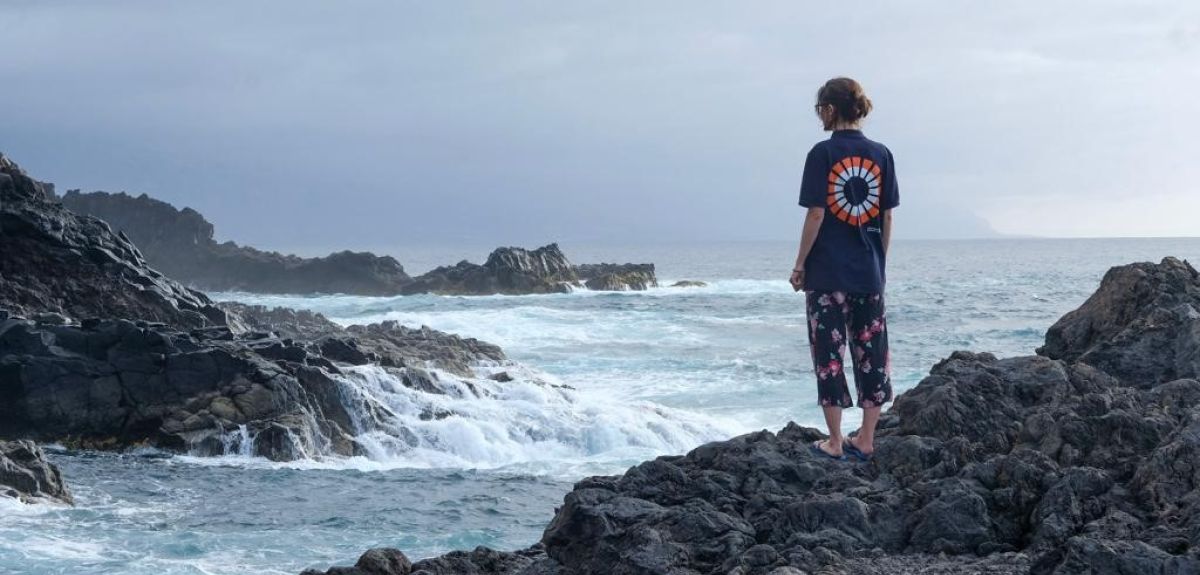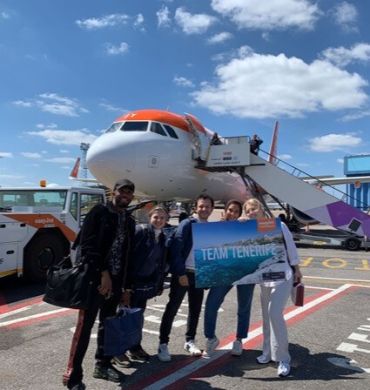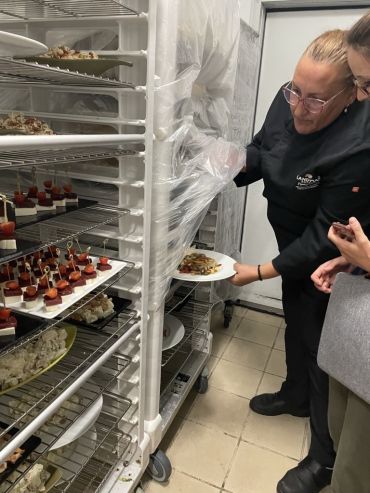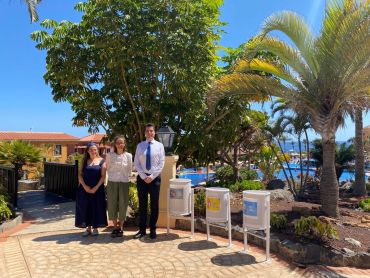
How Oxford students are helping to shape the future of sustainable tourism
In the summer of 2022, a ten-strong team of Oxford graduate students travelled to Tenerife, four of whom worked on a project to investigate food waste in hotels and holiday resorts on the Spanish island, as part of the easyJet holidays Sustainable Tourism Programme.
A collaboration between Oxford University’s SDG (Sustainable Development Goals) Impact Lab and easyJet holidays, the programme enables Oxford students to work alongside businesses to identify and deliver solutions that help develop sustainable travel. Reducing food waste is a global concern identified in the United Nations (UN) SDGs and is considered the third most promising solution to address climate change.
Just 10 months on, the work of these ‘SDG Impact Lab Fellows’ is having a tangible real-world impact following the UK-based tour operator’s unveiling of an initiative that will utilise the power of AI to reduce food waste and run more sustainable kitchens in destinations where it offers package holidays.
The project team was made up of a diverse group of Oxford students studying a range of subjects as varied as International Development and Archaeological Science, and from as far afield as South Africa and Bolivia. Over four weeks they undertook research to understand the scale of the issue of food waste in the island’s hotels and develop evidence-based solutions to tackle it.
 The SDG Impact Lab Fellows travelling to Tenerife to undertake research on sustainable tourism and food waste in the hospitality sector
The SDG Impact Lab Fellows travelling to Tenerife to undertake research on sustainable tourism and food waste in the hospitality sectorSDG Impact Lab Fellow, Laura Ballerini, a PhD Candidate in International Development, talks about how the team went about it: ‘We carried out mixed-method research and relied on a two-pronged approach. The first was a quantitative survey which we sent to a sample of 85 hotels in Tenerife to ascertain pre-existing approaches to sustainability and current food waste management mechanisms.
‘The second approach involved in-depth, semi-structured interviews with hotel directors, managers, and staff. These interviews aimed at gaining greater insights into the experiences and practices used by hotels to tackle food waste. Interviews were often accompanied by what we called ‘kitchen-based ethnography’, which essentially consisted of visits to hotel kitchens and long, informal conversations with chefs and kitchen staff.’
The team also engaged with a wide range of stakeholders with expertise in food waste, including leading researchers from local universities, public officials, private-sector experts, and representatives of local NGOs.
 The team visited hotel kitchens to understand more about current food waste management practices
The team visited hotel kitchens to understand more about current food waste management practicesDesmond Okumbor, who completed the Lab Fellowship alongside an MSc in Politics Research, describes the value of key stakeholder engagement: ‘Presenting to stakeholders proved to be an informative and enlightening experience. During this process, we were afforded the opportunity to gain an in-depth understanding of the critical issues at hand, which in turn allowed us to effectively identify and evaluate potential areas where our contributions could provide substantial value.’
Their research revealed that 18% of food waste in Tenerife was generated by the hospitality sector alone and that most hotels on the island had limited to no measures in place to adequately quantify the amount of food waste they generated.
The team recommendation was a partnership with Winnow, a UK tech company, to provide AI solutions to enable hotels and resorts in Tenerife to measure and prevent food waste. They pitched their business case to easyJet holidays in July 2022.
 Laura (right) and Desmond (left) conducting interviews about sustainability and food waste with a hotel director (middle) in Tenerife.
Laura (right) and Desmond (left) conducting interviews about sustainability and food waste with a hotel director (middle) in Tenerife. Based on the Oxford team’s recommendations, easyJet holidays has now formed a first-of-its-kind partnership with Winnow for the launch of a pilot programme that will monitor the reduction of food waste at one of their most popular hotels, the Bahia Principe Sunlight Costa Adeje resort in Tenerife.
Using technology similar to that of driverless cars, Winnow’s AI tools learn to ‘see’ food being wasted through a connected terminal with a motion camera. Data is shared with hotel teams who receive reports that pinpoint waste, giving them the insight to make operational improvements. Typically, kitchens using this form of AI solution see food waste halved within 12-18 months.
Project team member Desmond Okumbor explains: ‘AI Winnow is a smart solution to food waste because it leverages AI technology to provide automated data collection, insights and recommendations, real-time feedback, and cost savings for businesses. By helping businesses to reduce their food waste, it can also contribute to reducing the environmental impact of food waste.’
 Ruby-Anne Birin (far left) and Laura (second from the left) and the Deputy Manager of the Bahia Principe Sunlight Costa Adeje resort
Ruby-Anne Birin (far left) and Laura (second from the left) and the Deputy Manager of the Bahia Principe Sunlight Costa Adeje resortLaura Ballerini, a PhD Candidate in International Development, said, ‘It was an immense joy to see that the research efforts my team put into unpacking the major issue of food waste informed the launch of a first-of-its-kind pilot programme with the potential to make a substantial, tangible impact!’
MPP+MBA student Diego Rojas-Arancibia reflects positively on his experience as a Lab Fellow: 'I had a great time working with eJh. We were able to lead our own research, and work on something that can achieve real impact. Moreover, without the field research, we would not have been able to understand hotels' needs. Having a combination of training and field research helped us not only to come up with a strong project, but also to learn different leadership skills’.
Following the successful outcome of the first year of the SDG Lab’s Sustainable Tourism Programme, a second cohort of Oxford students are undertaking Lab Fellowships to develop strategic and destination-based projects to help make easyJet holidays an industry leader in sustainable tourism.
Established in 2021, the SDG Impact Lab brings together the research expertise of Oxford University with partners across industry sectors, to address the most pressing challenges of our time. The Lab’s programmes enable talented graduate students to collaborate with non-academic partners to identify creative, interdisciplinary solutions that advance the UN SDGs.
Find out more about the SDG Impact Lab.
 What US intervention could mean for displaced Venezuelans
What US intervention could mean for displaced Venezuelans  10 years on: The Oxford learning centre making an impact
10 years on: The Oxford learning centre making an impact Oxford and The Brilliant Club: inspiring the next generation of scholars
Oxford and The Brilliant Club: inspiring the next generation of scholars New course launched for the next generation of creative translators
New course launched for the next generation of creative translators The art of translation – raising the profile of languages in schools
The art of translation – raising the profile of languages in schools  Tracking resistance: Mapping the spread of drug-resistant malaria
Tracking resistance: Mapping the spread of drug-resistant malaria